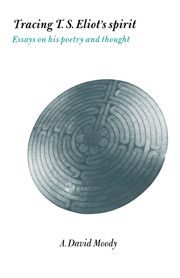1 - The American strain
Published online by Cambridge University Press: 05 November 2011
Summary
Eliot was an American, and a poet. But was he an American poet? In his origins and his upbringing he could hardly have been more American. His mother was descended from one of the original members of the Bay Colony, and his father was descended from an Eliot who settled there in 1667. His grandfather had been one of the founding fathers of St Louis, and was especially noticed by Ralph Waldo Emerson when he visited the city in 1852: ‘This town interests me & I see kind adventurous people; Mr. Eliot, the Unitarian minister, is the Saint of the West, & has a sumptuous church, & crowds to hear his really good sermons. But’, he added, in a comment to which time has lent its ironies, ‘I believe no thinking or even reading man is here in the 95000 souls. An abstractionist cannot live near the Mississippi River & the Iron Mountain.’ We know that at least one ‘abstractionist’ was born in St Louis, on 26 September 1888, and did much of his growing up there. And then his northeastern roots carried him back to the Massachusetts coast, where the family spent their summers, and to Harvard University, with which they had strong connections. Given all this, how could Eliot not be an American poet?
Yet William Carlos Williams, with his commitment to creating a poetry from the local conditions of American life and from the speech of Americans, was quite sure Eliot was not with American poetry but against it.
- Type
- Chapter
- Information
- Tracing T. S. Eliot's SpiritEssays on his Poetry and Thought, pp. 3 - 17Publisher: Cambridge University PressPrint publication year: 1996



